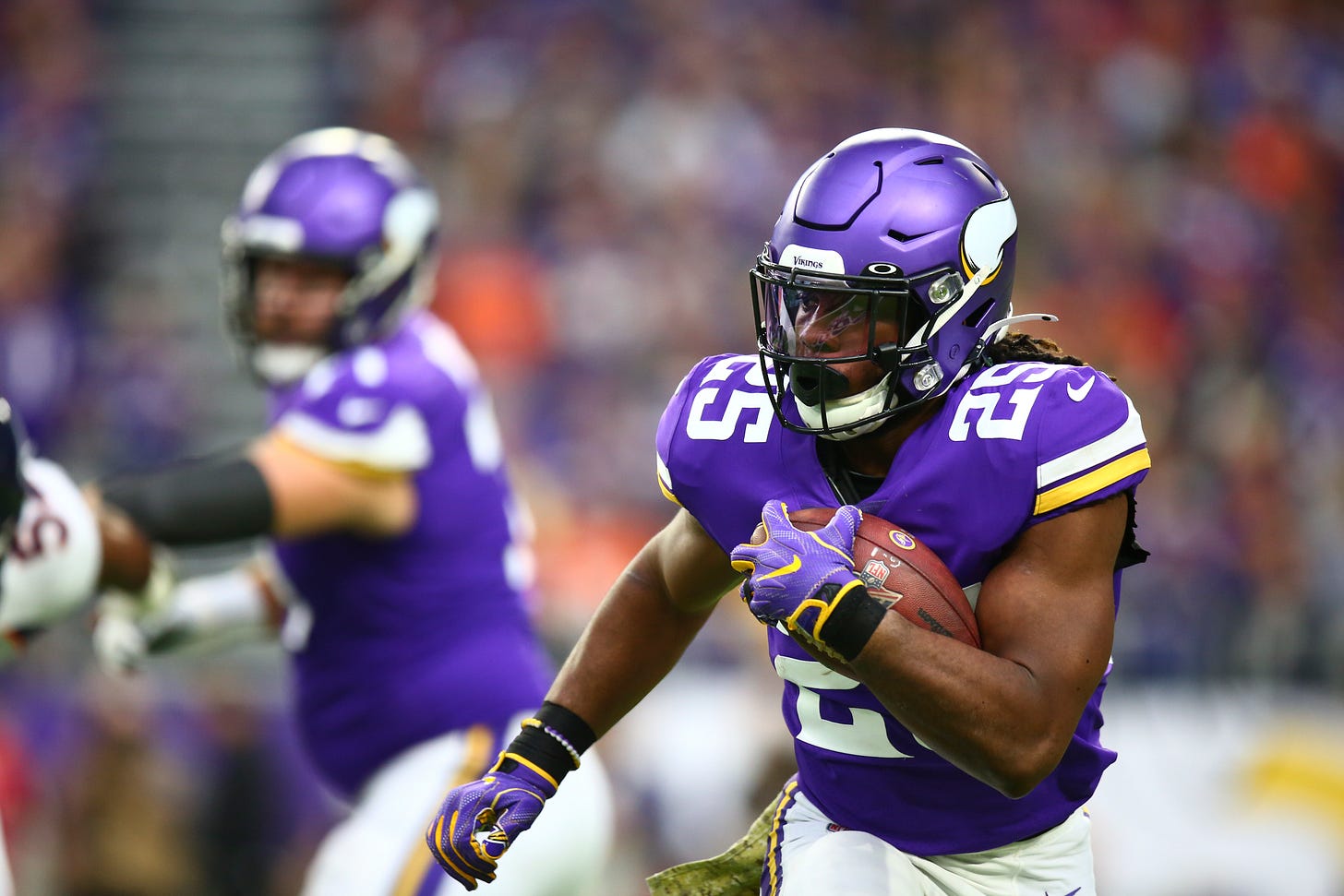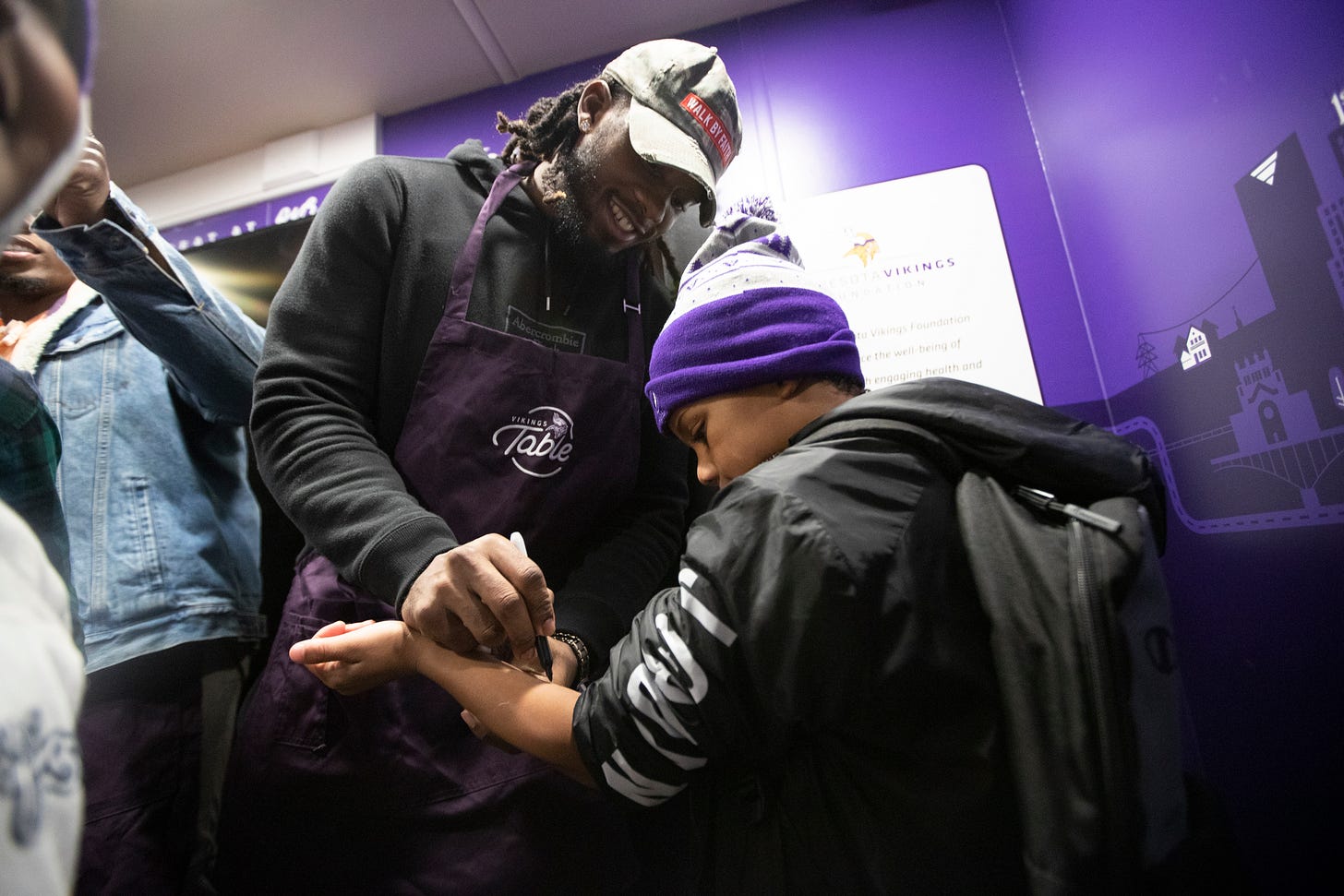Alexander Mattison is ready to use his voice
Vikings' standout rookie wants to be part of the next generation of vocal athletes on social issues

*Photo courtesy of the Minnesota Vikings
Welcome to Purple Insider: A daily newsletter covering everything Minnesota Vikings by Matthew Coller. With credentialed access combined with a creative and fun approach, my goal is to keep you informed and entertained. Please subscribe if you’d like to read more!
Listening to Revered Al Sharpton speak at George Floyd’s funeral service, Minnesota Vikings running back Alexander Mattison was touched emotionally like few other times in his life.
“To hear the testimonies of his brothers and his sister and to see his family down there, it was something that hit my heart at a level that I haven’t felt in awhile,” Mattison said on the Purple Insider Podcast this week.
Those moving moments solidified something that Mattison had known for a long time: That he wanted to be part of the solution.
“Being there, feeling that room, feeling that passion, feeling the words that came out of Al Sharpton’s mouth, that was something for me, I knew that I needed to do my part and try and do the best that I can to use my voice, to use my platform to continue to make change,” Mattison said. “He couldn’t have said it any better, ‘the time is now.’”
Since Floyd was killed by Minneapolis police officer Derek Chauvin, there has been a tectonic shift in the NFL’s role on matters of social justice. Players have spoken out against racial inequality and police violence toward black people in a way that we never could have imagined several months ago.
Initially the league and owners had a mostly muted response to the movement aside from a handful of team statements condemning Floyd’s murder but after a group of players including Michael Thomas, Patrick Mahomes, Eric Kendricks and Anthony Barr published a video demanding action, commissioner Roger Goodell made a statement acknowledging the league’s past shortcomings on social matters. In his video, Goodell used the words, “Black Lives Matter.” Again, you wouldn’t have dreamed it back in March.
Goodell has since said that he encourages teams to consider signing Colin Kaepernick, who was blackballed from the league (which paid out a collusion settlement to Kaepernick) because he kneeled during the national anthem. While his protest was aimed at shining a light on police violence and it was a green beret named Nate Boyer who suggested kneeling, the message was muddied by raging political debates over his protest.
Some players still kneeled in solidarity despite outside pressure from fans, teammates, politicians and news network debate shows but owners and many coaches pushed back. Television broadcasts stopped showing the anthem. Other players lost their jobs or struggled to find lucrative deals because they followed Kaepernick’s lead.
A young player like Mattison, who was a freshman in college when Kaepernick first knelt, understood when he entered the NFL that it was important to avoid making too much noise on social justice matters — especially when his own coach Mike Zimmer had repeatedly made clear that he did not want players kneeling.
“Colin Kaepernick took a knee and his dreams where thrown down the drain,” Mattison said. “Everything that he worked for his whole life, the career that he built up was taken away because he used his first amendment right in a peaceful way. That for me, coming out of high school going into college during that time and to see over the years and working to the point where I am now, that’s something that I had to think about it when this issue came up. Do I retweet this? Do I tweet this from my heart and my own mind? Do I share this? That’s something that I had to think about.”
But his concern over speaking out changed in the weeks following Floyd’s death, partly because he reached a breaking point and partly because the way in which players using their voices to protest inequality is viewed has morphed overnight.
Recent polls have found that more American people support players’ social stances than do not. The Vikings’ ownership has made sizeable contributions to social justice efforts and Zimmer told his players in a meeting that he will have their backs. In a conference call with the Twin Cities media, Kendricks explained why Zimmer’s support was important to the players.
“It was a big thing because he communicated to us that he does not understand,” Kendricks said. “He is not from the same background. He does not share the same skin. He can’t begin to relate with us, but he hears us and he’s there for us. He expressed that if we want him to get involved with anything that we have going on as a committee, that he’s right there with us.”

*Alexander Mattison has been active in the community since joining the Vikings. Photo courtesy of the Minnesota Vikings*
Mattison has felt the impact of inequality from early in life. He understood when his mother put him into a duel immersion program to separate himself that everyone doesn’t have to be twice as good to go half as far. That everyone doesn’t have the experience of being pulled over while riding with a teammate and being told by the officer that they were stopped, “because I want to.” That everyone isn’t expected to fail when rather than succeed when they grow up black in San Bernardino, as Mattison did.
“For me growing up, it was never an easy time,” Mattison said. “I made sure that I was going to make it out of a city where I was nothing but a statistic. It’s one of those things where people say, ‘innocent until proven guilty,’ but really it’s the other way around. That’s the walk of life for me and people like me, my friends, my family growing up. It was always that story.”
Having just turned 22 and heading into his second year in the NFL, he finds himself looking back and wondering how it could have been different and thinking about how he can help the next generation have things better than he did.
“I’m happy to see the change around the league and see so many coaches and owners and players standing together for this because they know even in the NFL there is a power that we have to make a change with our platform,” Mattison said. “That’s something we should be doing and we’ve wanted to do but the system is trying to hold people back from exposing things that are going on in the world and trying to ignite that change.”
Change won’t come without action. Vikings players have a group that is working together called the “Social Justice Committee,” which met with Minneapolis Police to express their viewpoints and discuss viable ways to avoid the next George Floyd.
“Our goal that we talked about in the Social Justice Committee is bridging that gray area,” Mattison said. “Uncomfortable conversations where you understand me as a black man, I understand you as a police officer…get that conversation where [we’re saying], ‘why do you kill us? Why do you fear for your life? Why do I fear for my life?’”
The committee plans to amplify these discussions to a wider audience because in order to fix the problem, everyone must understand the problem.
“That’s something that came up that’s going to be really effective for us where we have an on-stage seminar where we broadcast this to where people can watch this,” Mattison said.
Over the past few months, most of America has gone through some type of monumental life shift, whether it’s opening eyes to injustice or losing jobs because of COVID-19 and so on. For the Vikings’ running back, the past few months have made him certain of who he wants to be and how he wants to use his voice. And because of the efforts of players around the league, he can do it now.
“It’s freeing to know I don’t have to be scared to share my heart and share my mind,” he said.
Check out our sponsor SotaStick and their Minnesota-inspired gear by clicking the logo. Use the code PurpleInsider for free shipping.

